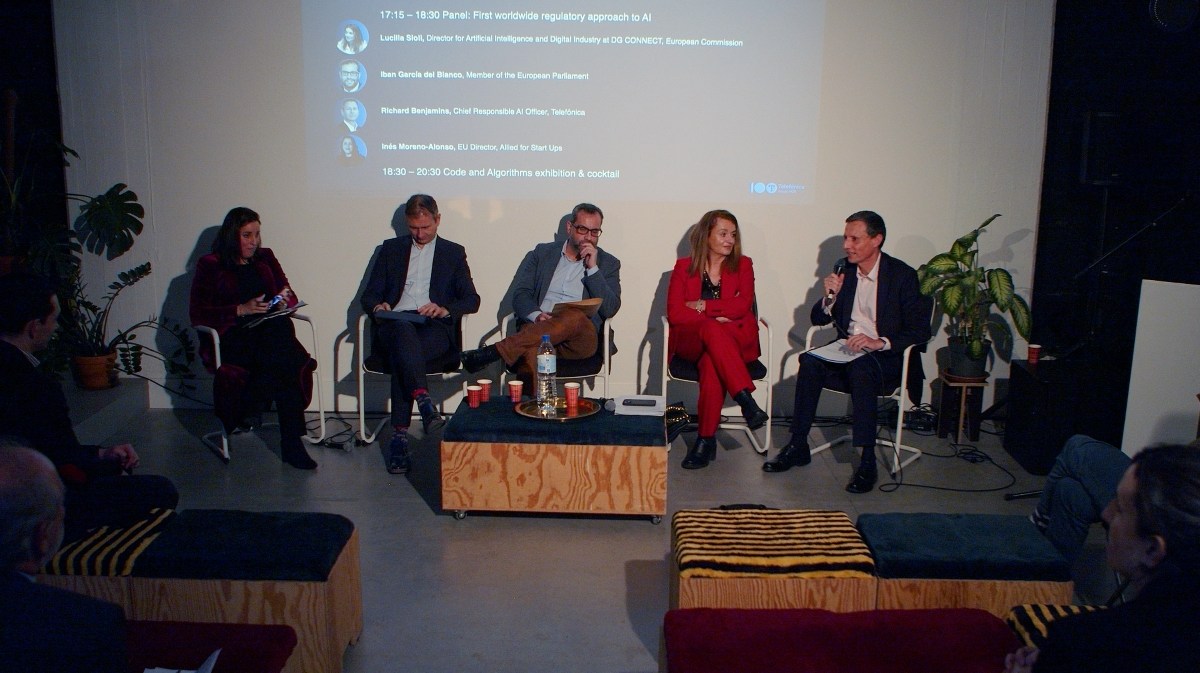On January 23rd, the Telefónica Policy Lab was presented to Brussels [stakeholders] with the event “Code of the Future: The Infinite Possibilities of AI Unleashed,” organized at the iMAL, Art Center for Digital Culture & Technology in Brussels, hosting Telefónica’s Foundation exhibition “Code & Algorithms: Wisdom in a calculated world”, and with the support of the Spanish Embassy to the Kingdom of Belgium. The exhibition inaugurated last November as a part of the events of the Spanish Presidency of the EU will still be running until 18th February.
The event focused on the policy and regulatory landscape of Artificial Intelligence, with a specific emphasis on the AI Act. It was the first time after the political agreement on the EU AI Act, reached last December under the leadership of Spanish Presidency, that policy makers leading the negotiating team on the AI Act exchanged views with legal experts and industry leaders on the ethical and regulatory frameworks necessary to unlock the potential of AI, balancing technological breakthroughs with policies that foster innovation while protecting privacy, security, and societal well-being.
The Imperative for Responsible AI Governance in the EU
The event, moderated by Juan Montero, Chief Public Policy, Competition & Regulatory Officer, explored the delicate balance between competitiveness, innovation, and responsibility in the AI era, aiming to contribute to a shared vision and commitments for a sustainable and equitable future.
Juan Montero stressed the transformative power of artificial intelligence, propelling societies into a new era of innovation and economic expansion. The European Union has demonstrated proactive leadership in this paradigm shift by finalising the landmark Artificial Intelligence Act. This regulation, adopting a risk-based approach, aims to foster a safe and reliable AI ecosystem and position Europe as a global leader.
We hope to find European leadership in the field of Artificial Intelligence, not only in setting the first comprehensive Regulation on AI, but very importantly in leading innovation, by creating new services for the benefit of Europeans
At the global level, various agreements, including the Biden Executive Order, OECD updates, UNESCO’s Ethical AI Recommendation, and the forthcoming Council of Europe AI Convention, underscore the collective effort to mitigate the risks of AI development, including generative AI.
While the EU’s commitment to responsible AI regulation is commendable, maintaining a delicate equilibrium between competitiveness and innovation is paramount. Drawing inspiration from the United States’ light-touch regulatory approach, the EU must strike a balance that encourages experimentation and nurtures a dynamic ecosystem of startups and tech giants.
The implementation of the AI Act requires careful consideration to protect individuals and society, while fostering an environment where businesses can thrive globally. Close collaboration between policymakers, industry stakeholders, researchers, and innovators is essential to refine and adapt the governance model for AI, addressing the rapid advancements that outpace institutional responses.
Defending our European values
In his keynote speech, Carlos Romero Duplá, Counsellor for Digital Transformation at the Permanent Representation of Spain to the EU, highlighted the relevance of the political agreement reached on the AI Act as a milestone of the Spanish Presidency due to the importance of defending our European values and welcomed the balanced approach of this legislation.
He praised the risk based approach of the AI Act which makes this legislation pro-innovation. Finally, his emphasis was on the global nature of AI and the importance of international negotiations.
Juan Montero introduced the panel debate highlighting the EU’s commitment to a human-centric approach to the AI Act. However, awareness of the need for competitiveness and innovation in this field is needed, particularly in Europe. Striking a delicate balance that fosters responsible AI development while safeguarding fundamental rights and ensuring EU leadership is our collective compass for a better and more humane world.
The Infinite Possibilities of AI Unleashed
The panellists discussed various aspects of the AI Act, emphasizing its importance for society and the need for a balanced regulatory framework that fosters innovation while ensuring safety, reliability, and ethical use of AI.
Lucilla Sioli, Director for Artificial Intelligence and Digital Industry at the European Commission’s DG Connect, emphasised the significant benefits of the AI Act for society, highlighting the role of AI in building trust. She stressed the need for Member States to implement and comply with this framework to guarantee the development and take-up of trustworthy AI in the EU.
Iban García del Blanco, Member of the European Parliament, welcomed the AI Act as a commendable balance in regulation and highlighted the importance of employment and education in promoting AI inclusion and literacy. The ultimate goal of the AI Act is to offer strong safeguards for our citizens and our democracies in order to ensure that AI models are not misused and do not present systemic risks to the EU.
Richard Benjamins, Chief Responsible AI Officer, recalled that as a telecommunications operator, Telefónica is not very exposed to high-risk uses of AI in its interactions with customers. He stressed the importance of AI transparency requirements to facilitate compliance and allocation of responsibilities between users, developers and intermediaries. Fully committed to ethical AI and the notion of ethics by design, Telefónica was one of the first companies in the world to have Ethical AI Guidelines back in 2018. Flexibility and responsiveness are also crucial to ensure that regulations keep pace with technological developments and support Europe’s continued leadership in AI regulation. Investment in research and development are needed to keep Europe at the forefront, fostering collaboration between academia and industry to attract top talent and drive breakthrough discoveries.
Finally, Inés Moreno-Alonso, Allied for Starts Ups stressed that small economic players with limited resources will struggle to comply with the AI Act, one of the most complex and burdensome regulatory initiatives to date. She further highlighted the difficulty of being a start-up in Europe compared to the US and that policy and regulation needed to focus on the wider commercial environment to ensure that European startups can remain competitive and innovative in the AI revolution.
The debate was followed by a visit to the exhibition from Telefónica’s Foundation “Code and Algorithms: Wisdom in a Calculated World.”
All in all, the event served as a comprehensive platform for discussions on the AI regulatory landscape, with different perspectives contributing to a well-rounded understanding. It highlighted the importance of a balanced approach that encourages innovation while ensuring the ethical and responsible use of AI.









